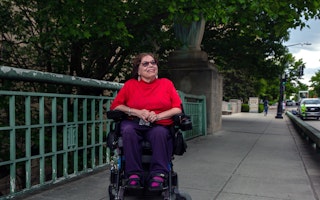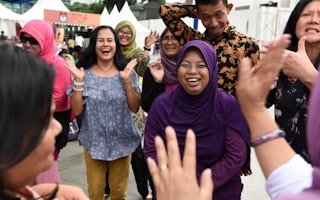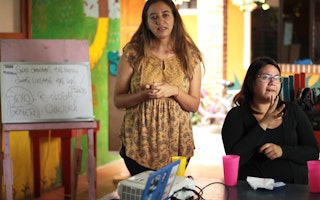In Kazakhstan, Having a Disability Often Means Not Getting a Vote
By Parkhat Yussupjanov

In Almaty, Kazakhstan, a visually impaired citizen decided to vote in the recent election. It was a Sunday, and her caregiver service was closed, so a passerby helped her to the polling station.
As she entered, she found herself in a wholly inaccessible space, with no tactile flooring, no sound signals on the doors, and no information offered in braille. The staff was untrained in assisting people with disabilities; some even tried to use visual gestures to explain to the blind person which way to go. Finally, in the absence of braille ballots, an observer helped the woman cast her vote, even though observers aren’t allowed to enter voting booths.
Only one polling station in Almaty—a facility for war veterans and people with disabilities—could be considered accessible for someone who is visually impaired. Clearly, this was not that polling station.
People with disabilities face many challenges in Kazakhstan, and exercising their right to vote is one of them. Research conducted during parliamentary elections this year revealed just how many obstacles people with disabilities face when it comes to simply casting a ballot.
Equal participation by people with disabilities in all levels of elections is intertwined with their participation in society in general, which helps to eliminate disability-based discrimination. Improving access to elections would bring new positive changes to public policies and practices. And making such changes visible to the public can help change attitudes towards people with disabilities.
I’ve witnessed this firsthand. In February and March, I had the privilege of participating in a project to monitor the electoral rights of people with disabilities in three cities in Kazakhstan: Astana, Almaty, and Pavlodar. This monitoring was aimed at analyzing, both qualitatively and quantitatively, the political participation of people with disabilities in the country.
I worked as a coordinator for Almaty, Kazakhstan’s largest city with a population of around 1.7 million. The elections we studied took place on March 20. We trained 10 observers to work in 10 polling stations in Almaty, including institutions inaccessible to people with disabilities.
We also conducted face-to-face interviews and polling of more than 120 people with hearing, visual, and physical disabilities. As a result of our interviews, we established that most of the interviewees anticipated that polling stations would be inaccessible for them, which was why they did not plan to participate in the elections.
Some of the respondents would have preferred to vote accompanied by their personal caregivers, but caregivers funded by local governments are not permitted to work weekends, and these elections were held on a Sunday.
During the elections, we also discovered a lack of training for polling station officials in dealing with people with disabilities. At the end of the day, we established that only a few people with disabilities had visited each of the polling stations we observed—an unfortunate situation, given that some simple fixes could readily improve this.
First of all, polling stations should be fully accessible for voters with all types of disabilities, not just wheelchair users. As a visually impaired person, I can attest that tactile paving, information and ballots in braille, sound devices for accessibility, and large-print ballot papers would go a long way towards helping people like me cast my vote. Visual aids for hearing-impaired people and wheelchair-accessible booths are also necessary.
There should also be in-depth training for electoral commission officials on how to communicate with and assist people with all types of disabilities.
In my opinion, these actions and procedures are capable of dramatically increasing the participation of people with disabilities in the electoral process in Kazakhstan.
Unfortunately, we do not have any official statistics on the number of disabled citizens exercising their right to vote in Kazakhstan. In light of the country’s ratification of the UN Convention on the Rights of Persons with Disabilities, it is crucial to conduct advocacy campaigns, and our advocacy project is just the start.
In the future, we may advocate for changing Election Day from Sunday, when elections usually take place in Kazakhstan, to a weekday. We can also adopt positive experiences from other countries. Jordan, for instance, is making its electoral processes accessible and inclusive for people with disabilities. I personally know a blind Jordanian senator who taught me how to train polling station officials in dealing with people with disabilities.
I hope that after all our efforts bring positive results, we will also be able to state proudly and loudly that in Kazakhstan we have senators, members of parliament, and top-level officials with disabilities.
Parkhat Yussupjanov is a grantee of the Open Society Foundations.
Parkhat Yussupjanov is a disability rights activist in Kazakhstan.


